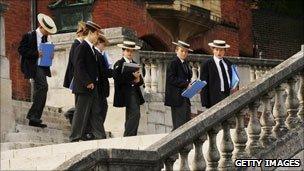Private schools charity status 'subsidising luxury'
- Published

Independent schools are using a "tax payer subsidy" to provide luxuries like golf courses, beagling and shooting for their pupils, a court will hear.
Private schools in England and Wales have to show they provide a "public benefit" in exchange for their tax-free charitable status.
But the Independent Schools Council is mounting a legal challenge to how the public benefit rules are interpreted.
It argues there is too much emphasis on private schools providing bursaries.
Charity rules
Last week the Upper Tribunal, sitting at the Royal Courts of Justice in London, began taking evidence into the rules surrounding the charitable status of independent schools.
The Independent Schools Council, representing more than 1,200 private schools, has argued that the Charity Commission is defining public benefit too narrowly.
It wants to clarify the charity rules - and is calling for schools to be able to put more emphasis on their partnerships with local state schools and the sharing of facilities and expertise.
But on Monday the court will receive evidence from a group of educationalists and lawyers, the Education Review Group, which argues that independent schools are being allowed unfair tax advantages through their charitable status.
The group claims that private schools enjoy tax breaks worth £88m per year - with some of these schools providing a luxury "gold-plated" service at a cost that is prohibitive to most families.
'Beagle pack'
Professor Ron Glatter of the Education Reform Group said: "The law has just not kept pace. Fees of up to £29,000 per year for just one pupil mean that such education is often the preserve of the super rich.
"But the public may be more surprised at what schools which claim to be charities provide - golf, shooting, horse riding, dressage. Some schools even offer beagling. Can we really say these should attract tax payers support?"
Paul Ridge, the group's solicitor, said: "We should end the pretence that such schools are charities. They are businesses for the children of elite parents."
Fiona Miller, speaking for the group, said: "Fee paying schools should be required to meet more, rather than less, stringent criteria, specifically linked to disadvantage and social mobility."
Independent schools have argued that they are already working in partnership with local state schools - and that the value of bursaries and financial support for poorer pupils is greater than the amount they gain in tax benefits.
The Charity Commission, whose guidelines to the 2006 Charities Act are being challenged, has argued that it already allows independent schools flexibility in how they show they are offering public benefit.